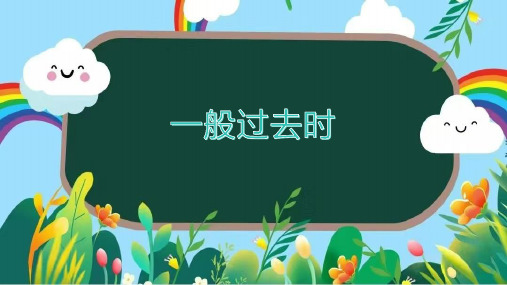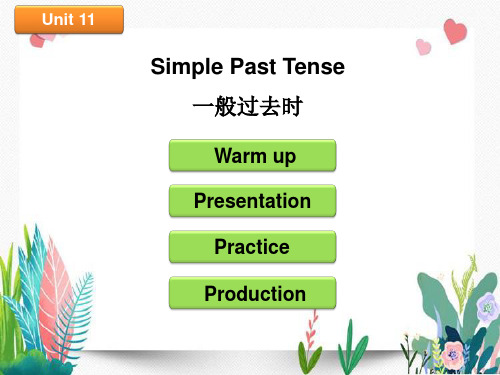小学英语一般过去时态PPT课件及习题
小学英语时态之 一般过去时讲解课件ppt

一般过去时:
定义: 一般过去时,是表示过去某一时刻或某一段时间内发生的动作或存在
的状态。
标志词: yesterday, just now, …ago, last…, this morning …
结构: 谓语是be动词
谓语是行为动词
肯定句: 主语+ was/were + 其他 否定句: 主语+ was/were + not + 其他 一般疑问句: Was/Were + 主语+其他? 肯定句: 主语+ 动词的过去式 + 其他 否定句: 主语+ didn’t +动词原形 + 其他 一般疑问句:Did + 主语+ 动词原形 +其他?
at the weekends this morning often
usually
last Mid-Autumn Festival
every day three days ago on Mondays
tomorrow a moment ago 14 years ago
找出表示一般过去时的时间副词。
( B) 1. My mother had breakfast and____to work.
A. go B. went C. going D. to go
( A)2. -- How __ your vacation?
-- It was pretty good. A. was B. were C. did D. do
( )3.Each student one picture.
A.draw B. draws C. drawing D.to drawing
小学英语六年级一般过去式复习课件PPT

1.Where did you go three days ago ?(去佛山) 2. Where did she go three days ago ? 3. Where did he go ? (去书店) 4. Where did they go? 5. Where did Sally go? (去学校) 6. Where did Mr. Liu go?
5) ---Where __B _ you ___ on your holiday? A. did do B. did go C. do go D. do did
Please answer the questions. (回答问题) 1)Where did you go last holiday? __I w_e_nt _to_th_e _lib_rar_y.______ 2)How did Funny go to the park? _F_u_nn_y _we_nt_to_th_e_pa_rk_o_n _foo_t._
其他: 1. Was …?
Yes,…was. / No, …wasn’t. 如: Was it sunny yesterday? 1) Was the weather rainy yesterday? 2) Was Miss Tang excited last week? 3) Was Huang Junjie bored?
其他: 1.Did ……+动词(原形)?
Yes,…did. / No, …didn’t. 如: Did you play football yesterday? 1) Did you________ the room? 2) Did she ______ swimming yesterday? 3) Did your leg hurt last Monday?
一般过去时(课件)

一般过去时(课件)一般过去时是英语中表达过去某个时间点或时间段发生的动作或状态的一种时态。
在一般过去时中,动词的形式需要根据主语的人称和数进行变化。
一般过去时的句型结构是:主语 + 动词过去式 + 其他。
一、一般过去时的构成1. 规则动词:在动词原形的基础上加上ed。
例如:work → worked, play → played, study → studied。
二、一般过去时的用法1. 表示过去某个时间点发生的动作。
例如:I went to the library yesterday.2. 表示过去某个时间段内发生的动作。
例如:We playedfootball last weekend.3. 表示过去某个时间段内的状态。
例如:She lived in New York for five years.4. 表示过去习惯性动作。
例如:He used to smoke when he was young.三、一般过去时的疑问句和否定句1. 疑问句:将助动词did放在主语之前,动词原形放在助动词之后。
例如:Did you watch the movie last night?2. 否定句:在主语和动词之间加上助动词did,动词原形变成动词的过去式,并在动词过去式前加上not。
例如:I didn't finish my homework yesterday.四、一般过去时的特殊用法1. 过去进行时:表示过去某个时间点正在进行的动作。
例如:What were you doing at 8 o'clock last night?2. 过去完成时:表示在过去某个时间点之前已经完成的动作。
例如:I had finished my work before he came.3. 过去完成进行时:表示在过去某个时间点之前一直在进行的动作。
例如:She had been waiting for two hours when he finally arrived.一般过去时(课件)一般过去时是英语中表达过去某个时间点或时间段发生的动作或状态的一种时态。
一般过去时讲解课件(共19张PPT).ppt

否定句
1) 主语+wasn’t/weren’t+表语
He wasn’t a student ten years ago.
2) 主语+didn’t+动词原形+其他
They didn’t have a good time last night.
4.一般过去时的结构
一般疑问句
was为单数; were为复数
一般过去时的结构
4.一般过去时的结构
was为单数; were为复数
肯定句
1) 主语+was/were+表语
He was a student ten years ago.
2) 主语+动词过去式+其他
They had a good time last night.
4.一般过去时的结构
was为单数; were为复数
时间+ago类 in+年份类
yesterday morning;yesterday.... last night; last week...
two days ago in 2023
动词过去式的变化
3.动词过去式的变化 1.直接加ed work--worked look--looked 2.不发音的e结尾,去e加ed hope--hoped like--liked 3.重读的闭音节词,双协结尾字母加ed stop--stopped plan--planned 4.以辅音字母加y结尾,变y为i再加ed study--studied try--tried 5.不规则变化
What did they do last night?
总结与练习
5.总结与练习
一般过去时 1.定义:表示一个过去发生的动作或表示过去存在的状 态 2.标志词:yesterday,last...,....ago, just now..... 3.动词的过去式变化 4.一般过去时的各种句型:
小学一般过去时ppt课件

常与表示过去的时间状语连用
如yesterday, last week等。
2024/1/26
8
肯定句使用场景举例
1 2
描述过去发生的事情
如"I went to the park yesterday."(我昨天去 了公园)。
表达过去的习惯或经常性动作
如"She always walked to school when she was young."(她年轻时总是步行去学校)。
5
时间状语及标志词
2024/1/26
时间状语
yesterday,last week,an hour ago等。
标志词
ago(以前),just now(刚才 ),then(那时)等。
6
PART 02
肯定句结构与用法
REPORTING
2024/1/26
7
肯定句结构特点
主语 + 动词过去式
表示过去某个时间发生的动作或状态。
式。
注意动词变化
掌握规则动词和不规则动词的 过去式变化,避免使用时出现
错误。
结合语境理解
在阅读和听力练习中,结合上 下文语境理解一般过去时的用
法。
模仿和练习
通过模仿和练习,逐渐熟练掌 握一般过去时的运用技巧。
2024/1/26
26
THANKS
感谢观看
REPORTING
2024/1/26
27
疑问句句尾语调上升。
2024/1/26
16
疑问句使用场景举例
对过去发生的事情进行提问。
2024/1/26
对过去某个时间点的状态进行 提问。
对过去某个时间段内发生的动 作进行提问。
小学英语小学英语语法课件-一般过去时 (共37张PPT) 全国通用

Presentation Sentences
一般过去时的主要用法和概念:一般过去时表示在过去某时 发生的动作或存在的状态,常与表示过去的时间状语 yesterday, last week, ago等连用。
一般过去时的用法: ① 表示过去时间里发生的动作或存在的状态,常与表示过去 的时间状语yesterday, last year, ago, the day before, yesterday, just now等连用。 ② 表示在过去一段时间里,经常性或习惯性的动作或状态, 常与always, often, usually等连用。
一般疑问句:a_t_t_h_e_l_iv_e__s_h_o_w_?_______________________ How many people were there at the
对划线部分提问:_l_iv_e__s_h_o_w_?________________________
Practice Oral Practice
Unit 11
Simple Past Tense 一般过去时
Warm up Presentation
Practice Production
Warm up
Free talking: What do you usually do on weekdays?
I usually get up at 6:00, I put on my clothes, make the bed, brush my teeth, wash my face. I have breakfast at 6:40, then wipe the table. I go to school at 8:00, and eat lunch at 12:00. Then I usually do my housework at 6:00, take a bath at 7:00, and watch TV at 7:45, and go to bed at 9:00.
通用版英语六年级下册 小升初语法之一般过去时 课件(共43张PPT)

即学即练
Lucy often watched TV in those days. 否定句: Lucy didn’t often watch TV in those days. 一般疑问句: Did Lucy often watch TV in those days? 肯否回答: Yes, she did./ No, she didn’t.
year. 1.表示过去存在的状态。
We had Thanksgiving party last year
2.表示过去发生的动作。
考点一:一般过去时标志词
1.yesterday 系列
yesterday
morning afternoon evening
the day before yesterday
即学即练
用be动词的适当形式填空 1. What __w_a_s__ the name of your first teacher? 2.— Where __w_e_r_e_ you last night?
— I _w__a_s__at my grandparents’ home. 3. Where _w__a_s__ your father born? 4. My parents _w__e_r_e_ in Shanghai in 2006.
即学即练
句型转换
1. They came to China in 1990.(变一般疑问句) __D_i_d_ they _c_o_m__e_ to China in 1990?
2. I was ill for two days last week.(变一般疑问句) _W__e_r_e_ __y_o_u__ ill for two days last week?
一般过去时讲解PPT课件

did
助动词,用于构成一般过去时的 疑问句和否定句。
主语
句子中的动作执行者,可以是名 词、代词等。
例如
What did you do yesterday? 你 昨天做了什么?
其他成分
包括宾语、状语等,根据句子需 要而定。
动词原形
指动词的基本形式,即不加任何 时态或语态标记的形式。
特殊疑问句实例分析
when、after、 before、as等引导的 表示过去的时间状语 从句。
已经、曾经、刚才、 那时等表示过去的时 间副词。
02
一般过去时肯定句结构
主语+动词过去式+其他成分
01
02
03
主语
句子中的主体,可以是人 、物或抽象概念。
动词过去式
表示过去某个时间里发生 的动作或状态。动词的过 去式可分为规则变化和不 规则变化两种。
表示过去某个时间里发生的动 作或状态。
用法
陈述过去的事实或情况,描述 过去经常或反复发生的动作。
现在完成时
表示过去发生的动作对现在造 成的影响或结果,或从过去已 经开始,持续到现在的动作或 状态。
用法
强调过去与现在的联系,表达 一个动作从过去一直延续到现
在。
两者在时间状语上的区别
01
02
03
04
一般过去时
一般过去时讲解PPT课件
目录 Contents
• 一般过去时基本概念 • 一般过去时肯定句结构 • 一般过去时否定句结构 • 一般过去时疑问句结构 • 一般过去时特殊疑问句结构 • 一般过去时与现在完成时的比较
01
一般过去时基本概念
定义与作用
定义
一般过去时表示过去某个时间里 发生的动作或状态。
- 1、下载文档前请自行甄别文档内容的完整性,平台不提供额外的编辑、内容补充、找答案等附加服务。
- 2、"仅部分预览"的文档,不可在线预览部分如存在完整性等问题,可反馈申请退款(可完整预览的文档不适用该条件!)。
- 3、如文档侵犯您的权益,请联系客服反馈,我们会尽快为您处理(人工客服工作时间:9:00-18:30)。
Did they have…?
Did your father go…?
Did Tom and Jack study…?
It was sunny.
How was the weather ?
The vacations were great .
How were the vacations ?
I did my homework yesterday.
saw a film on TV
What did she do?
She cooked a big meal.
What did he do?
He painted a picture.
What did she do?
She marked the pupils’ homework.
Was the man at home yesterday? No, he wasn’t at home. He was in the classroom.
She played soccer last Sunday. He cleaned his room last week.
last year,
before 1990,
等表示过去的时间状语连用.
yesterday; the day before yesterday; long long ago; once upon a time; long before; just now; in those days; at that moment(time); then; in the past; last+时间; in+过去时 间; 时间+ago this moring
feel-- felt
Exercise Were 1. _____(be) you busy yesterday afternoon?
was (be) at school this morning. 2. She _____
3. Jane and Ann weren _____ (be ’ t not) friends before. didn’ t not) live in Guangzhou 4. He _____ (do before 2000. saw 5. I ____(see) a film with Ann yesterday.
Did she play…?
They had a summer camp last weekend.
My father went to the beach three years ago. Tom and Jack studied for the test three days ago.
Did he clean…?
写出下列动词的过去式: help-- helped prepare--prepared stop-- stopped is-- was go-- went get-- got call-- called love-- loved study-- studied worry--worried skip-- skipped are-- were say-- said do-- did see-- saw have-- had
Free talk
What’s the date What was the date yesterday? today? Were you happy yesterday? Was your English teacher busy last week? Did you watch TV last night? What did you do yesterday evening? Where were you yesterday afternoon? When did you get up this morning? How did you go to school before? How long did you stay at school yesterday ? How much lucky money did you get last Spring Festival? Who gave you the most lucky money last year?
was B: It ____Friday.
Calendar(日历)
动词过去式变化规律
1、动词词尾直接加-ed ———————————————————— eg. work—worked finish—finished listen--listened 2. _________________________________________ 以不发音e结尾,动词词尾加-d eg. like—liked live—lived phone--phoned 3.__________________________________________ 以辅音字母加y结尾的动词,把y变成i再加-ed eg. study—studied carry—carried try--tried 4.._________________________________________ 闭音节动词,双写词尾字母再加-ed eg. stop—stopped skip—skipped shop--shopped 5._________________________________________ 不规则动词 eg. am—was go—went get—got
A: What day___ is it today ? B: It __ is Sunday. was was A: What day ____it yesterday? B: It____Saturday. was it the day before yesterday ? A: What day ____
What did the man wash? He washed a dog.
Where did you go last Sunday? I went to Hua Mountain.
What time did he go to school this morning? He went to school at eight o’clock.
What did the boy do after school yesterday ? He played football.
What did he do after class yesterday? He played basketball.
What did the man read? He read newspapers.
Did she…?
Yes, she did. No, she didn’t.
washed some clothes
Did she..?
Yes, she did.
No, she didn’t.
cleaned the house
Did he…?
Yes, he did. No, he didn’t.
Miss Lin
Who marked the pupils’ homework yesterday? She was Miss Lin
一般过去时
一般过去时表示过去发生的动作或状态,常与
yesterday,
the day before yesterday, two months ago, this morning in 2000,
did not clean
did not have
did not go
It was sunny.
Was it…?
I did my homework yesterday.
She played soccer last Sunday. He cleaned his room last week.
Did you do…?
Please write down what they did yesterday!
给下面的单词写出过去式
1.get-- got 2.say-- said 3.have-- had
4.be-- was, were 5.tell-- told
7.write-- wrote 10.read-- read 8.drive-- drove 11.see-- saw
用所给动词的适当形式填空。
1. We ______ lived (live) in Japan last year. 2. Jack________ stopped (stop) the car last Sunday.
3. Tom _______ cleaned (clean) my room and ______(study) studied
6.think-- thought
9.run-- ran 12.stand-- stood
13.put-- put
14.eat-- ate
15.buy-- bought
e-- came
16.drink-- drank 17.sleep-- slept
19.play-- played 20.study--studied 21.listen-- listened
call (call) me last Sunday? 6. Did you _____
do (do) last night? did 7. What ______ you _____
did (do) you live last year? 8. Where _____ get 9. What time did you ______( get) up this morning? go did you _______( 10. How ______ go) to school before?
人教版六年级英语
